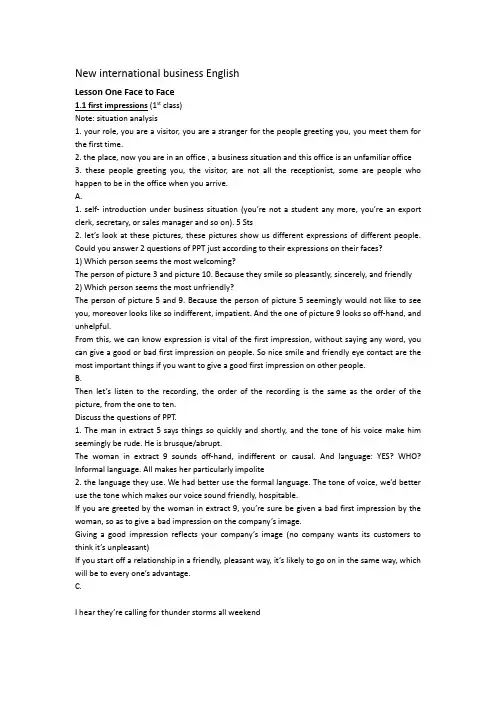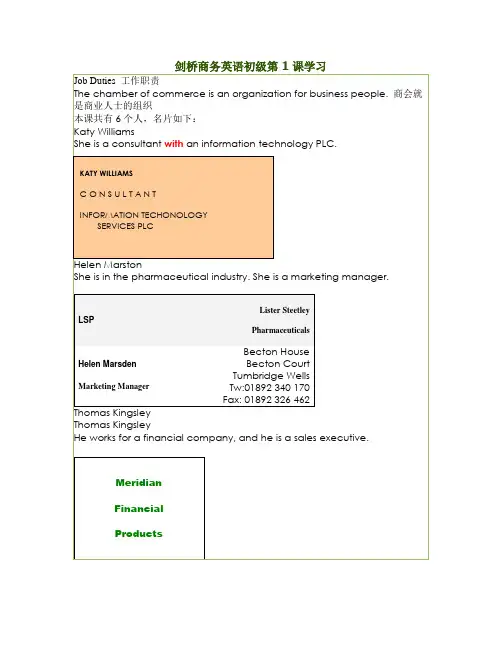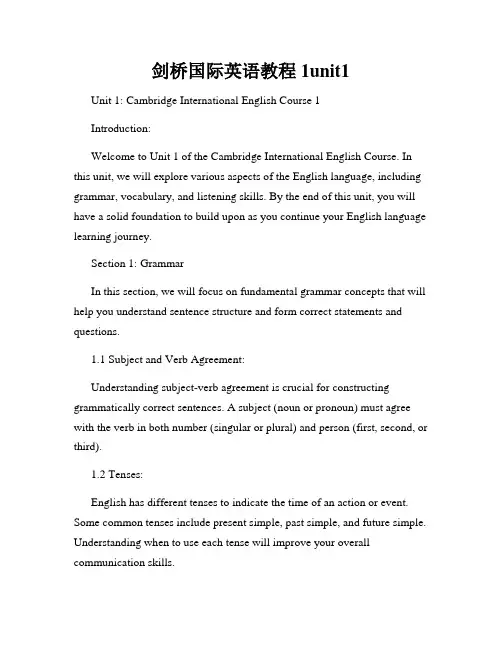剑桥国际商务英语第1课
- 格式:ppt
- 大小:377.00 KB
- 文档页数:24



New international business EnglishLesson One Face to Face1.1 first impressions (1st class)Note: situation analysis1. your role, you are a visitor, you are a stranger for the people greeting you, you meet them for the first time.2. the place, now you are in an office , a business situation and this office is an unfamiliar office3. these people greeting you, the visitor, are not all the receptionist, some are people who happen to be in the office when you arrive.A.1. self- introduction under business situation (you’re not a student any more, you’re an export clerk, secretary, or sales manager and so on). 5 Sts2. let’s look at these pictures, these pictures show us different expressions of different people. Could you answer 2 questions of PPT just according to their expressions on their faces?1) Which person seems the most welcoming?The person of picture 3 and picture 10. Because they smile so pleasantly, sincerely, and friendly 2) Which person seems the most unfriendly?The person of picture 5 and 9. Because the person of picture 5 seemingly would not like to see you, moreover looks like so indifferent, impatient. And the one of picture 9 looks so off-hand, and unhelpful.From this, we can know expression is vital of the first impression, without saying any word, you can give a good or bad first impression on people. So nice smile and friendly eye contact are the most important things if you want to give a good first impression on other people.B.Then l et’s listen to the recording, the order of the recording is the same as the order of the picture, from the one to ten.Discuss the questions of PPT.1. The man in extract 5 says things so quickly and shortly, and the tone of his voice make him seemingly be rude. He is brusque/abrupt.The woman in extract 9 sounds off-hand, indifferent or causal. And language: YES? WHO? Informal language. All makes her particularly impolite2. the language they use. We had better use the formal language. The tone of voice, we’d better use the tone which makes our voice sound friendly, hospitable.If you are greeted by the woman in extract 9, you’re sure be given a bad first impression by the woman, so as to give a bad impression on the company’s image.Giving a good impression reflects your company’s image(no company wants its customers to think it’s unpleasant)If you start off a relationship in a friendly, pleasant way, it’s likely to go on in the same way, which will be to every one’s advantage.C.I hear they’re calling for thunder storms all weekend。



剑桥国际英语教程1unit1Unit 1: Cambridge International English Course 1Introduction:Welcome to Unit 1 of the Cambridge International English Course. In this unit, we will explore various aspects of the English language, including grammar, vocabulary, and listening skills. By the end of this unit, you will have a solid foundation to build upon as you continue your English language learning journey.Section 1: GrammarIn this section, we will focus on fundamental grammar concepts that will help you understand sentence structure and form correct statements and questions.1.1 Subject and Verb Agreement:Understanding subject-verb agreement is crucial for constructing grammatically correct sentences. A subject (noun or pronoun) must agree with the verb in both number (singular or plural) and person (first, second, or third).1.2 Tenses:English has different tenses to indicate the time of an action or event. Some common tenses include present simple, past simple, and future simple. Understanding when to use each tense will improve your overall communication skills.Section 2: VocabularyBuilding your vocabulary is essential for effective communication. In this section, we will explore strategies to expand your word bank and improve your language proficiency.2.1 Word Families:Word families consist of a base word and its related forms (nouns, verbs, adjectives, adverbs). Learning word families helps you understand how words are connected and how their meanings can be extended.2.2 Synonyms and Antonyms:Knowing synonyms (words with similar meanings) and antonyms (words with opposite meanings) allows you to express yourself more precisely and avoid repetition in your speech and writing.Section 3: Listening SkillsDeveloping your listening skills is crucial for engaging in conversations and understanding native speakers. In this section, we will provide strategies to enhance your listening abilities.3.1 Active Listening:Active listening involves focusing on the speaker, paying attention to verbal and nonverbal cues, and understanding the main ideas and supporting details. Practicing active listening will improve your overall comprehension skills.3.2 Note-Taking:Taking notes while listening helps you retain information and review key points later. Develop a system that works for you, whether it's using bullet points, diagrams, or abbreviations.Conclusion:Congratulations on completing Unit 1 of the Cambridge International English Course. By focusing on grammar, vocabulary, and listening skills, you have taken significant steps towards improving your English language proficiency. Remember to practice regularly and apply what you have learned in real-life situations. Good luck on your language learning journey!。




